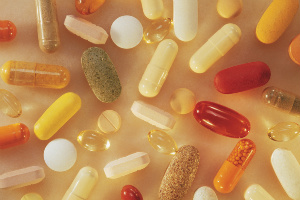Considering their fast-paced lifestyles, women are not always able to get the vitamins, minerals and other essential nutrients they need. According to a report published in the American Journal of Medicine, many American women are not eating the basic five to seven servings of fresh fruits and vegetables that they need to fulfill the daily requirements of calcium, magnesium and vitamins D and K.
Calcium/Magnesium
Adequate dietary intake of calcium and magnesium is an important factor related to osteoporosis. However, calcium alone cannot guarantee a woman’s overall bone health. The mineral magnesium is needed to help absorb calcium into the bones. Studies reported in the International Clinical Research Review revealed that magnesium deficiency appears to cause a deficiency in calcium as well. Women in the study were placed on low-magnesium diets, and all but one became calcium deficient. When given magnesium supplements, their calcium levels rose without additional calcium supplementation. Some researchers are now suggesting that more focus be placed on magnesium in preventing osteoporosis. Green leafy vegetables and dairy foods, including low-fat and nonfat, are high in calcium. Foods high in magnesium include halibut, cooked spinach, okra, pumpkin seeds, beans, nuts and cooked whole-grain cereals.
Vitamin D
Vitamin D helps the body absorb calcium and also helps regulate the immune system. However, a recent study found that nearly 1/2 of U.S. women of child-bearing age do not get enough vitamin D. Members of the Vitamin D Council, a nonprofit educational organization led by physicians, point out that while studies have failed to prove that vitamin D deficiency puts people more at risk for disease, research has shown that individuals with higher levels of vitamin D have a lower risk of disease. Although few nutritional sources contain vitamin D, most milk and many brands of orange juice, breakfast cereals, yogurt and even margarine are fortified with vitamin D. While the body makes vitamin D when exposed to the sun’s UVB, foods that naturally have vitamin D include egg yolks, sardines, tuna, mackerel, salmon and beef liver.
Vitamin K
Vitamin K is another essential nutrient needed for strong bones, as it aids in transporting calcium in the body. Researchers at Harvard Medical School are supporting a growing body of evidence that suggests vitamin K plays a significant role in bone health and therefore protects against osteoporosis. Vitamin K is also necessary to clot blood. Because the vitamin is fat-soluble, it is absorbed by the body, which means that there is no need for it to be consumed in large quantities. USDA Dietary Guidelines for Americans show that women need less vitamin K than men. The RDA for women is 65 mcg each day. Green leafy vegetables such as lettuce, broccoli, brussel sprouts, endive, scallion and cabbage are some of the best sources of vitamin K.
Vitamin C
Vitamin C helps the body absorb iron and is needed to build the collagen that gives form to blood vessels, cartilage, muscle and bone. While numerous clinical trials have suggested that vitamin C may lower the risk of developing cancer, information published by the American Cancer Society points out that there is no clear scientific evidence to date showing that taking high doses of vitamin C prevents cancer. In fact, consuming too much vitamin C can produce side effects. However, a study of women between the ages of 40 and 60, which was published in Public Health Nutrition, suggests that adequate intakes of vitamin C and calcium may help promote weight loss, especially around the waistline. Oranges and other citrus fruits, cantaloupe, potatoes, spinach, strawberries, broccoli and bell peppers are foods rich in vitamin C.
Iron
Iron is found in the body’s red blood cells, which carry oxygen to muscle tissue. Symptoms of low iron may include extreme fatigue, weakness, low endurance, headaches and dizziness. In a report published by the Ohio State University, Department of Human Nutrition states that men are able to store more iron than women; therefore, it is particularly important for women to consume adequate amounts of iron in their diets. However, according to the National Health and Nutrition Examination Survey, most women consume less iron in their diets than the U.S. Recommended Dietary Allowance, which is 18 mg/day for women between the ages of 19 and 50. Pregnant women and women who exercise for more than 1 hour each day need more iron. Dietary sources of iron, which the body absorbs easily, come from lean red meat, beef liver, chicken and turkey breast, tofu, shrimp, oysters and clams. Plant sources of iron are absorbed depending on the body’s need and include eggs, nuts, fortified whole-wheat bread and cereals.





